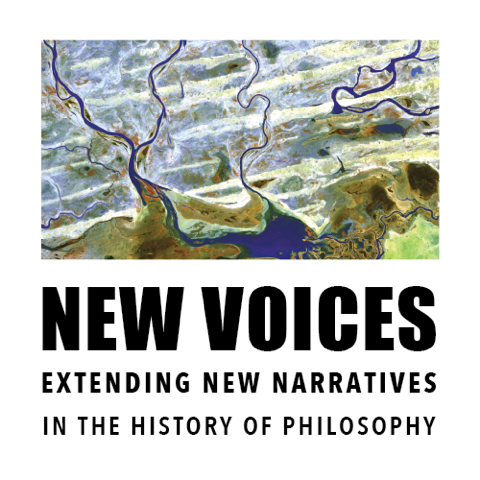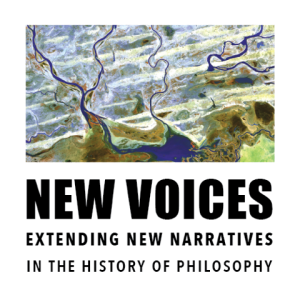
9.3K
Downloads
29
Episodes
New Voices is a podcast from the Extending New Narratives in the History of Philosophy Partnership, funded by the Social Sciences and Humanities Research Council of Canada. newnarrativesinphilosophy.net This podcast consists of conversations about philosophers from groups that have been underrepresented and excluded in the history of European and Western philosophy: their views, what is interesting and unique about them, and how they fit in to the periods that they were apart of. We also talk about what it is actually like to learn about and promote these ideas as a philosopher today: what benefits there are, what challenges there are, and just how to get going on this work.
New Voices is a podcast from the Extending New Narratives in the History of Philosophy Partnership, funded by the Social Sciences and Humanities Research Council of Canada. newnarrativesinphilosophy.net This podcast consists of conversations about philosophers from groups that have been underrepresented and excluded in the history of European and Western philosophy: their views, what is interesting and unique about them, and how they fit in to the periods that they were apart of. We also talk about what it is actually like to learn about and promote these ideas as a philosopher today: what benefits there are, what challenges there are, and just how to get going on this work.
Episodes

Friday Jan 30, 2026
Women and the 'Ingenium Philosophicum': Interview with Sabrina Ebbersmeyer
Friday Jan 30, 2026
Friday Jan 30, 2026
In this episode, Jacinta speaks with Sabrina Ebbersmeyer, Professor of Philosophy at Copenhagen University, about the perceived suitability of women for philosophy in the 17th and 18th centuries, especially in the Nordic and German context. We focus on two key figures, philosophers Anna Maria van Schurman and Elizabeth of Bohemia, and one key concept, ingenium. Professor Ebbersmeyer goes in depth about how philosophers thought about ingenium during this period (today we might use a different phrase such as talent, or ingeniousness), and she talks about how Schurman cleverly turned the concept to her own purpose of advocating for women’s education. Elisabeth of Bohemia, on the other hand, was held up as an exemplar of ingenium during her time. Professor Ebbersmeyer wraps up the episode with her thoughts on the importance of including women philosophers in philosophy curriculums, and how impactful it is for female students to be presented with them.

Monday Nov 10, 2025
Karoline von Günderrode's philosophy: Interview with Anna Ezekiel
Monday Nov 10, 2025
Monday Nov 10, 2025
In this episode, Jacinta speaks with Anna Ezekiel, honorary fellow in the philosophy department at the University of York, about Karoline von Günderrode, a 19th century German philosopher, poet, and dramatist. It is a wide-ranging conversation touching on multiple works by Günderrode, such as the unpublished essay fragment the Idea of the Earth and the play Udohla, and Ezekiel draws out the connections between Günderrode’s metaphysics and political philosophy, as well as explaining her concepts of the self, friendship and gender. Ezekiel’s scholarship has played an important role in increasing Günderrode’s profile in Anglophone philosophy, and she rounds out the episode by sharing the demands that are entailed by working on a figure whose works have not historically been considered philosophy.

Wednesday Jun 18, 2025
Wednesday Jun 18, 2025
In this episode Jacinta speaks with Dr Geneviève Barrette, postdoctoral researcher at Mcgill University, about Marguerite Porete, a turn-of-the-fourteenth-century mystic thinker. We focus on the context and content of Porete’s only surviving work, an edification treatise entitled The Mirror of Simple Souls.

Thursday Apr 24, 2025
Season 4, Episode 7: Hedwig Dohm's feminist philosophy: Interview with Katie Brennan
Thursday Apr 24, 2025
Thursday Apr 24, 2025
In this episode, Jacinta speaks with Dr Katie Brennan, Assistant Professor of Philosophy at Salve Regina University, about the 19th-century German feminist philosopher Hedwig Dohm. Brennan speaks about Dohm’s diverse philosophical modes, from salon-hosting to political essays to novellas, and how her participation in the urgent and burgeoning feminist discourse of her time shaped her philosophical approach. Dohm draws on distinct areas of philosophy, such as rights and existentialism, leading to a unique conception of human nature that Brennan is currently in the process of reconstructing. We speak about several of Dohm’s texts, with ongoing reference to her novella Become Who You Are, which still resonates today. Finally, Brennan wraps up the episode with some research advice, and reflections on the methodological challenges she’s faced while researching the under-served Dohm.

Monday Mar 10, 2025
Monday Mar 10, 2025
Welcome to this episode of the podcast. Today, we’re discussing the work of Sophie de Grouchy, an 18th and early 19th century philosopher whose contributions to moral and political thought have often been overlooked. Best known for her translation of Adam Smith’s The Theory of Moral Sentiments, Grouchy didn’t just translate—she developed her own ideas on sympathy, ethics, and politics in Letters on Sympathy.
Our guest, Getty Lustila, explores Grouchy’s place in the sentimentalist tradition, her engagement with questions of morality and human nature, and why her work matters for understanding the history of ethics. We discuss how she builds on and departs from Smith’s ideas, the role of sympathy in shaping moral and political life, and the broader intellectual context in which she was writing.

Monday Jan 20, 2025
Monday Jan 20, 2025
In this episode, we are happy to welcome Lauren Kopajtic, whose work explores the profound connection between literature and moral philosophy. Lauren shares her insights into how novels and plays—from the works of Joanna Baillie to Jane Austen—stimulate moral imagination and contribute to moral education. Together, we discuss key ideas like “sympathetic curiosity” and the cognitive and psychological capacities that literature cultivates, helping us better understand human character and moral judgment.
Lauren also highlights the philosophical influences behind her research, including the moral philosophy of Adam Smith, and how these ideas resonate in literary studies. Whether you’re a lover of literature, a student of philosophy, or simply curious about the educational power of stories, this conversation offers thought-provoking perspectives on how art shapes our ethical lives.

Friday Nov 15, 2024
Friday Nov 15, 2024
In this interview, we have the pleasure of speaking with Dr. Ruth Boeker, a leading scholar in early modern philosophy, focusing on the often-overlooked contributions of women philosophers. The discussion centers around Catharine Trotter Cockburn, an influential moral philosopher from the early modern period. Dr. Boeker will introduce us to Cockburn’s life and work, sharing how she became interested in Cockburn and what makes her an important figure among early modern thinkers.
We will delve into Cockburn’s moral philosophy, exploring key issues such as human nature, moral motivation, and the relationship between morality and religion. Dr. Boeker will also address the current state of literature on Cockburn, highlighting areas that have been explored and those that still need attention. Finally, we’ll explore Cockburn’s views on education and moral philosophy. This insightful conversation offers an opportunity to discover the depth and relevance of Cockburn’s philosophy today.

Wednesday Oct 02, 2024
Wednesday Oct 02, 2024
In this episode Jacinta speaks with Aminah Hassan-Birdwell, Assistant Professor in Philosophy at Emory University, about 18th Century Fante-British abolitionist and philosopher Ottobah Cugoano. We focus on his essay "Thoughts and Sentiments on the Evil and Wicked Traffic of the Slavery and Commerce of the Human Species," discussing its broad-spanning and interconnected critique of slavery, law, labour and colonization. Hassan-Birdwell considers the breadth of Cugoano’s perspective, explaining that he takes not only the suffering of the individual into account, but the health of their society, and looks not merely at British society, but the morality of nations across the globe. Hassan-Birdwell concludes the episode by offering advice to early career scholars commencing research on similarly marginalised philosophers.

Wednesday Aug 21, 2024
Wednesday Aug 21, 2024
In this episode, Dr. Elena Gordon, a postdoctoral researcher at McGill University, delves into the overlooked yet significant contributions of Catharine Macaulay to the philosophy of education. We explore Macaulay’s dual role as a historian and philosopher, her views on reason, sympathy, and the relationship between humans and animals, as well as her unique stance on educational reform. Dr. Gordon also reflects on Macaulay’s feminist perspective and offers advice for young researchers interested in reviving the voices of forgotten thinkers.

Monday Apr 29, 2024
Monday Apr 29, 2024
In this episode, Jacinta Shrimpton talks with Kristin Gjesdal, Professor of Philosophy at Temple University in Philadelphia. They discuss the 19th century philosopher Germaine de Staël's account of the passions, her abolitionism, and the existentialist themes that run through her work.
